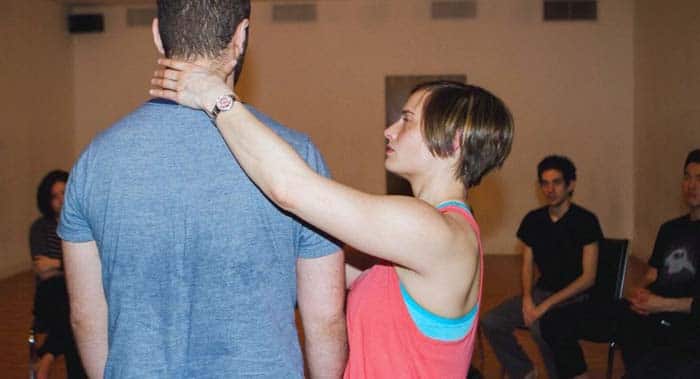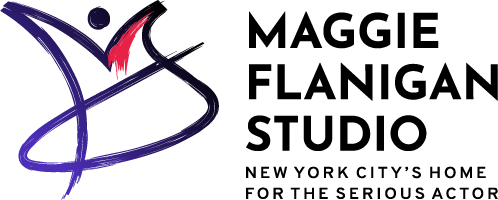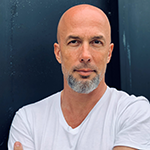APPLY FOR ADMISSION
FIRST YEAR MEISNER ACTING PROGRAM

BEGINS
SEPTEMBER 10TH

Call To Schedule an Interview
(917) 794-3878
Why Actors Need to Develop Listening Skills
The bedrock of acting, a core fundamental skill, is the ability to listen. The power of our voice is directly connected to the power of listening. If, when we are listening, we are thinking about what to say next, judging what has just been said, worried about criticism, or concerned about our physical appearance, then we’re not fully present. We physically shut down, and sabotage our ability to respond from unanticipated moment to unanticipated moment. Actors often describe this experience as, “I’m stuck in my head.”
The Discipline of Being Fully Present
In life, it’s easy to function without being fully present as listeners. On a checkout line, for instance, we may hear the information we need without forming a connection to the speaker. In casual social settings, we may politely nod our head and maintain eye contact, without being profoundly changed by what is said. Actors must demand more of themselves than what is serviceable in everyday interactions.
If we deepen our listening, we detect the details and tiny movements of the speaker’s face, notice their behaviors, perceive their mood, and feel the vibrations of their voice in our own body. We are susceptible to the nuances of the range, volume, and resonance of their voice. We are shaken by the texture of their consonants, and stirred by the length of their vowels. If we open ourselves up to it, we might even feel something of what they feel as they are speaking.
The Connection Between Breathing and Listening

When we truly listen, the body is relaxed and attentive, and the breath is free to travel where it needs to as called upon by the feeling of what is being heard and what is to be said. We then can be changed by the person we are listening to and respond to the subtext of what they have communicated with their full being. We are not stuck in our head: we are free in our body, and set up to respond with the full power of the voice. This is not easy to do in the imaginary world, and takes a full commitment to serious actor training
Recent Post
STUDENT TESTIMONIALS
“I was placed in the intense reigns of Charlie Sandlan. I became a better artist, actor, friend, sibling and daughter because of the studio. Even now, I crave the studio every day. What I learned is present in my work every day. I truly believe in everything they stand for.”

“Maggie taught me that I could control my work, my acting, and to throw all of the bullshit out that I had in my head about ‘what I should be doing’ and to just listen and respond honestly, in the moment. She gave me a craft. She is, quite simply put, THE BEST.”

“Maggie Flanigan taught me the true meaning of artistry, passion, and professionalism. I am certain that I continue to work as an actress because of my training with Maggie. At every audition and every performance, her guiding voice is with me. It is a gift beyond measure.”

“Maggie Flanigan is uncompromising, her instincts as a teacher are razor sharp. She doesn’t miss a beat”

“Maggie Flanigan has been one of the most important people in my artistic life. I want to work with Maggie trained actors. As an actor myself, she is my first source. I do not say this lightly, if you are serious about acting, and willing to work very hard, then go to Maggie.”

“Maggie helped me find my sense of truth, an actors greatest asset. Maggie is an expert at instilling that vital ingredient, which allows an actor’s potential to become limitless. My work will forever be rooted in the clarity and honesty she helped me develop.”

“After working for ten years, I did the 2 year program, and now feel that I have the tools I need to become the actor I’ve always dreamed of being. Maggie Flanigan instilled in me a clear sense of truth and a standard of perfection. I am a better actor because of this studio.”

“As an actor, the core of what you have to rely on is your sense of truth and humanity. Maggie allowed me to discover and embrace mine. Trusting my sense of humanity and truth has given me the ability to take risks in my work and my career decisions.”

“Maggie Flanigan has the unique ability to get an actor to the essence of what is true in a moment. She creates a safe and caring environment in which to work.”

“Maggie Flanigan introduced me to my own spirit and my own sense of Truth. Her passion for teaching and ability to communicate are rare gifts to any actor looking for a technique to set his or her talent free. Maggie’s voice has been the one constant guide in my career.”




